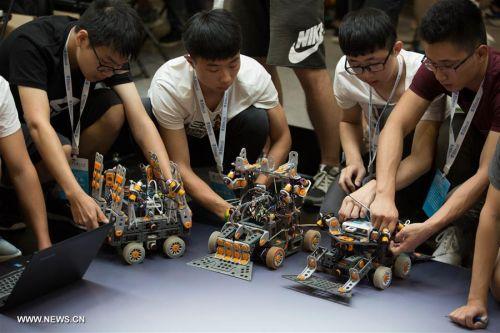
Contestants debug robots during the World Robot Conference 2017 in Beijing, capital of China, Aug. 23, 2017. The five-day robot conference kicked off Wednesday with the theme "Win-Win Collaborative Innovation Toward the Building of an Intelligent Society". (Xinhua/Jin Liwang)
WASHINGTON, Aug. 23 (Xinhua) -- China bought 90,000 robots in 2016, accounting for almost a third of the global total, and the robot revolution may raise China's economic competitiveness, according to a report released this week by Bloomberg Intelligence.
"China is installing more robots than any other nation, and that may affect every other nation," said the report.
Installations of industrial robots in China are growing fast, making up about a third of the global total in 2016, and the number will nearly double to 160,000 in 2019, according to an estimation by International Federation of Robotics.
Due to its massive working population, China still lags behind regarding robot density. There are about 50 robots for every 10,000 workers in China, compared to the global average of about 75.
Automation is a sword cutting both ways. Robots may drive up productivity and economic competitiveness, but may also exacerbate income inequality.
"Increasing use of robots should be bad news for medium-skilled workers, especially those in sectors where routine work means scope for automation," the report quoted BI economists Tom Orlik and Fielding Chen as saying. "Yet wage growth in China remains rapid."
Wages of domestic manufacturing workers with a high-school education rose by 53 percent from 2010 to 2014, according to China Household Finance Survey data cited by BI.




 A single purchase
A single purchase









